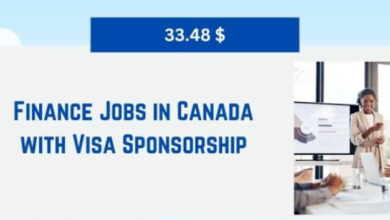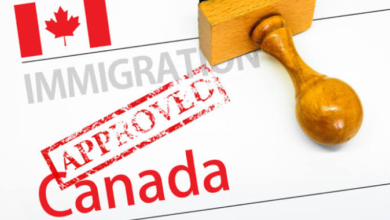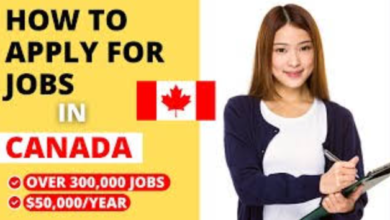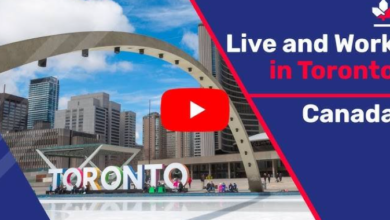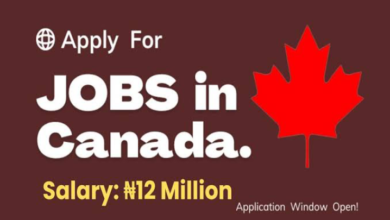Canada Marriage and Job Visa Sponsorship: Unlocking your Pathway to Permanent Residency
Canadians and permanent residents can bring their husbands, wives, or common-law partners to live in Canada by sponsoring them for immigration. If the sponsorship is approved, the person being sponsored becomes a permanent resident, and the couple (or family, if it applies) can start their new life together in Canada. Also, the job visa sponsorship allows you to obtain permanent residency by getting a visa sponsorship job from a Canadian company. In this article, we will be showing you how to unlock your pathway to permanent residency by getting a Canada marriage and job visa sponsorship among other relevant information.
Canada Spousal Sponsorship
In Canada, the Marriage visa, better known as the Spouse Visa is one of the commonest types of visas among foreign nationals. Unlike other temporary visas, the Canadian Spouse Visa is a Permanent Resident Visa. If you’re a foreign citizen married to a Canadian citizen or permanent resident, you can apply for this visa. Once granted, you have the right to live and work in Canada. To get this visa, you need to be sponsored by your spouse. The sponsorship application can be submitted whether you’re currently living in Canada or outside of it.
Eligibility Criteria
A. Who can become a Sponsor?
You’re eligible to become a sponsor if you meet the following criteria:
1. You are at least 18 years old.
2. You are a Canadian citizen, registered under the Canadian Indian Act, or a permanent resident living in Canada. If you’re a Canadian citizen living outside Canada, you need to demonstrate that you intend to live in Canada when your sponsored relative becomes a permanent resident. Note that permanent residents living outside of Canada cannot sponsor someone.
3. You can prove that you’re not receiving social assistance for reasons other than a disability.
4. You must demonstrate the ability to provide for the basic needs of:
- Youself
- Your spouse or partner
- Your spouse or partner’s dependent child(ren), if applicable
- Your dependent child(ren) if you’re sponsoring only your dependent child.
It’s important to note that in most cases, there’s no specific minimum necessary income (MNI) requirement when sponsoring a spouse, partner, or dependent child. However, if the person you’re sponsoring has a dependent child who, in turn, has a dependent child of their own, or if the dependent child you’re sponsoring has a dependent child, then you must meet the minimum income requirement.
B. Who Cannot Become a Sponsor?
You might not be eligible to sponsor if:
1. You’re sponsoring a spouse or partner, but you previously signed an undertaking for a different spouse or partner, and it hasn’t been three years since they became a permanent resident.
2. You sponsored someone before and didn’t repay any social assistance they received during the sponsorship period.
3. You’re in default on an immigration loan or a performance bond.
4. You haven’t paid court-ordered alimony or child support.
5. You’ve declared bankruptcy, and it hasn’t been discharged.
6. You were convicted of:
- An offence of a sexual nature.
- A violent crime.
- An offence against a relative causing bodily harm or threatening/attempting such offences. The eligibility depends on the nature of the offence, how long ago it occurred, and if you received a pardon.
7. You’re sponsoring a spouse or partner, and you were previously sponsored as a spouse, common-law, or conjugal partner and became a permanent resident of Canada less than five years ago.
8. You’re under a removal order.
9. You’re in a penitentiary, jail, reformatory, or prison.
10. You’ve already applied to sponsor your current spouse or partner and haven’t received a decision.
Furthermore, if you previously sponsored family members who received social assistance during the sponsorship period, you can’t sponsor until you repay the full amount or settle the debt with the relevant government authority. Defaulting on an immigration loan, missing payments for transportation, assistance, or right of permanent residence fee loans, or failing to meet court-ordered support payments to a spouse or child also disqualifies you from sponsoring until you resolve these matters. If you provided a performance bond, you must pay the full amount before being eligible to sponsor. Additionally, a five-year sponsorship bar applies if you were sponsored as a spouse or partner, preventing you from sponsoring a new spouse or partner within five years of becoming a permanent resident. The sponsorship bar for violent crime restricts those convicted of crimes causing bodily harm to certain relatives from sponsoring family members. The applicability of these rules depends on the date we received your sponsorship application.
C. Who Can Be Sponsored?
You’re eligible to sponsor your spouse, common-law partner, conjugal partner, or dependent child. It’s important to demonstrate that you intend to live in Canada when the sponsored person becomes a permanent resident. However, it’s worth noting that permanent residents residing abroad cannot sponsor from outside of Canada.
Canada Spousal Visa Sponsorship Documents Required
When applying to sponsor a spouse, certain documents and proofs are often required:
1. Completed application forms.
2. Proof of status in Canada.
3. Identity documents.
4. Marriage certificate.
5. Police certificates and clearances from all countries your spouse lived in for six months or longer past the age of 18.
6. Medical certificate for your spouse.
7. Proof of payment for applicable government fees.
8. Passport photo.
9. Relationship Information and Sponsorship Evaluation Questionnaire.
10. Additional documents such as wedding invitations, photos, birth certificates or adoption records for children, and proof of marriage registration with a government authority.
To show your relationship, provide at least two of the following documents:
- Proof of joint property ownership.
- Shared bank accounts.
- Utility bills with both names.
- Copies of government-issued IDs.
- Car insurance.
- Pay slips or tax forms showing the same address.
For common-law relationships, additional evidence is expected, including the Relationship Information and Sponsorship Evaluation questionnaire, birth certificates or adoption records for shared children, photos depicting the conjugal relationship, proof of cohabitation for at least one year, and at least two of the listed documents indicating the recognition of your common-law partnership.
For conjugal relationships, evidence should include shared residence, economic support (joint financial arrangements, shared bank accounts, etc.), and recognition of your relationship by friends and family. Immigration officers look for proof of significant emotional and interpersonal ties indicating a serious, committed relationship to remain long-term. If specific documents are challenging to provide, creative ways to show the relationship should be explored, such as letters from family or friends. Ultimately, the visa officer’s decision regarding common-law documents is discretionary, but providing sufficient proof enhances the chances of acceptance.
Canada Spousal Visa Sponsorship Processing Time
Sponsorship applications usually take about 12 months to process from beginning to end. While they generally don’t get processed much faster than this timeframe, it’s important to note that the processing duration can extend beyond 12 months, especially if your case is complex or if the visa office requires additional evidence to support your relationship. In such instances, the processing time may be prolonged.
Canada Spousal Visa Sponsorship Cost
Noteworthy, the government processing fees for sponsoring your spouse, conjugal partner, or common-law partner in Canada are as follows. If your spouse, conjugal partner, or common-law partner has dependent children, an extra $150 payment is required for each child included in the application.
- Sponsorship fee: $75
- Principal applicant processing fee: $490
- Right of permanent residence fee: $515
- Biometrics: $85
- Total: $1165
For sponsors residing in Quebec or planning to reside there upon obtaining permanent residence, an additional fee of CAD 310 is applicable, in addition to the mentioned fees.
Canada Spousal Visa Sponsorship Application Guide
There are two modes of application – the Outland application and the Inland application.
For the outland application, If you are currently in Nigeria or any other country, including Canada, your Canadian citizen or permanent resident partner will have to sponsor you through the outland application route. This is also the route to take if you are in Canada but unable to apply for a spouse visa for some reason. It’s suitable if you are in Canada but need to frequently leave and re-enter the country due to work, allowing you to move freely during the application process. If you are a conjugal partner, the outland route is the only option, but it takes longer than the inland route. In this process, your partner applies to IRCC to be a sponsor, and you apply to be a permanent resident. However, note that you cannot apply for permanent residency until your partner’s sponsorship application is approved. While your partner’s application goes to IRCC in Canada, yours is directed to the Canadian visa embassy in Nigeria or the country where you have legally stayed for at least a year.
For the inland application, if you are already in Canada on another type of visa, such as study, work, or tourist visa, you have the option to apply for permanent residence through the inland application route. Both your sponsor’s application and your permanent residence application will be submitted to the IRCC. It’s important to note that you and your partner must have been living together for at least 1 year in Canada to be eligible for this route.
The inland application route offers significant benefits, including a shorter processing time. Additionally, you can remain in Canada while the IRCC processes your application. Another advantage is that you can apply for a full-time work permit (open work permit) while your permanent residence application is being processed
However, it’s important to be aware that, if you choose this route, you should not leave Canada during the processing time. Your residence status becomes indeterminate while your permanent residence application is being processed, making re-entry into Canada impossible.
Canada Job Visa Sponsorship
The Temporary Foreign Worker Program (TFWP) offers a pathway for foreign nationals to temporarily work in Canada, particularly in unskilled positions. This program allows Canadian employers to hire foreign workers to fill roles that haven’t been filled by Canadian residents. Managed by Immigration, Refugees and Citizenship Canada (IRCC) and Employment and Social Development Canada (ESDC), the TFWP is designed to meet the needs of the Canadian labour market. After they have arrived in Canada, foreign nationals can then apply for permanent residence.
Eligibility Criteria
Ensure both the employer and the person looking for a job meet the requirements before joining the Temporary Foreign Worker Program (TFWP). This helps make the process of moving to Canada smoother. To qualify for the TFWP, certain things need to be done:
1. The employer has to get a positive Labour Market Impact Assessment (LMIA) before the worker can apply for a work visa. This is like a permission slip from the government saying it’s okay for a foreign worker to have the job. The process involves the employer proving they tried to hire a Canadian first. The employer submits a detailed application to Employment and Social Development Canada (ESDC), sharing info about the job and how they tried to find a Canadian for it. ESDC then checks if everything is okay. Once approved, the employer can use this to support the worker’s visa application. The visa is usually just for that job and that employer. So, a Canadian company can help a foreign worker get a visa to come to Canada.
2. The employer has to be ready to pay for everything connected to the person getting the job.
3. The person looking for the job has to get a real job offer in Canada.
4. There must be proof that the person plans to leave Canada once the work permit ends.
5. The person needs to show they have enough money to take care of themselves and their family while in Canada.
6. No criminal record is allowed for the person applying.
7. The person should be in good health.
8. They need an official letter from a Canadian business saying they’re accepted.
9. The person has to prove they’re not a danger to Canada’s national security.
10. All the necessary papers for getting a Canadian visa must be ready.
11. The person must meet the set age and language skills requirements.
Jobs with Visa Sponsorship in Canada
1. Chef/Cook
Annual Salary: $33,800-$40,950
There are plenty of job opportunities for chefs or cooks in Canada, making it accessible to all applicants. This role is in high demand, and while formal education is not mandatory, having a culinary school certification can be an advantage. The primary responsibilities include meal preparation, kitchen coordination, supervision of kitchen staff, maintaining cleanliness, creating menus, determining portions, and arranging buffets.
2. Drivers
Annual Salary: $35,000 – $75,000
This unskilled job position consists of bus drivers (short or long distances) as well as truck drivers. A degree is not required, and duties revolve around driving vehicles and delivering goods. Opportunities exist in manufacturing, distribution, sales, and transportation companies, and there’s potential to establish your own driving business.
3. Farm Workers
Annual Salary: $27,300 – $39,111
The agricultural sector in Canada actively seeks farm workers for tasks like planting, weeding, ploughing, and harvesting. Formal education is not compulsory, but physical fitness is crucial due to the demanding nature of the job. The position may involve long hours during farming seasons and could require work in rural and remote areas.
4. Housekeeper
Annual Salary: $27,300-$30,685
If you enjoy cleaning spaces, the role of a housekeeper could be suitable. Work can be in private homes or office settings, and responsibilities include cleaning surfaces, making beds, doing laundry, and ensuring overall tidiness. A college degree is not strictly required, but some locations may prefer candidates with housekeeping experience.
5. Meat Cutter
Annual Salary: $38,100 – $45,000
Those comfortable dealing with various types of meat might find the role of a meat cutter appealing. Responsibilities include preparing meat for sale and distribution. Opportunities range from small shops to industrial settings, and formal education is not necessary, but hands-on experience is essential.
6. Welder
Annual Salary: $37,000 – $76,000
Welding is a sought-after trade in Canada that does not require a degree. Welders use metals to create and repair objects in sectors like manufacturing, automobiles, and engineering. While not mandatory, attending a welding school or apprenticeship program can enhance skills and impress potential employers.
Conclusion
Getting a marriage or job visa in Canada can open up various opportunities for both personal and professional development. If you’re looking to reunite with family, the Canadian government has programs that allow spouses and partners to join their loved ones. On the other hand, if you’re seeking work, Canada provides avenues for skilled and unskilled workers to contribute to its diverse job market even with sponsorship.

